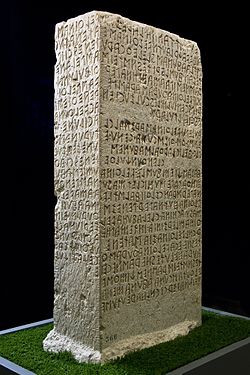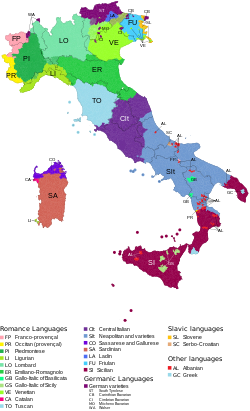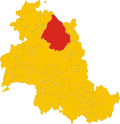Umbrian is an extinct Italic language formerly spoken by the Umbri in the ancient Italian region of Umbria. Within the Italic languages it is closely...
80 KB (9,470 words) - 05:31, 25 May 2025
The Osco-Umbrian, Sabellic or Sabellian languages are an extinct group of Italic languages, the Indo-European languages that were spoken in central and...
14 KB (1,611 words) - 23:13, 25 May 2025
extinct Indo-European language of southern Italy. The language is in the Osco-Umbrian or Sabellic branch of the Italic languages. Oscan is therefore a...
38 KB (4,226 words) - 02:07, 26 May 2025
ancient Italic languages are Faliscan (the closest to Latin), Umbrian and Oscan (or Osco-Umbrian), and South Picene. Other Indo-European languages once spoken...
40 KB (4,267 words) - 16:25, 25 May 2025
in modified form after the language disappeared. In addition to being the source of the Roman and early Oscan and Umbrian alphabets, it has been suggested...
123 KB (12,401 words) - 03:36, 2 June 2025
remained distinct from *β in Latin and Venetic, but also merged in Osco-Umbrian. *tl > *kl word-medially. Final *t became *d *l̥, *r̥ > *ol, *or *m̥, *n̥...
86 KB (4,606 words) - 13:01, 16 June 2025
Volscian was a Sabellic Italic language, which was spoken by the Volsci and closely related to Oscan and Umbrian. Volscian is attested in an inscription...
9 KB (1,352 words) - 03:14, 2 January 2025
plainly an Italic language, and Eric P. Hamp in 1954 thought it more closely related to Latino-Faliscan than to the Osco-Umbrian languages, many authorities...
15 KB (1,370 words) - 14:34, 15 October 2024
century BC. Includes the ancient Osco-Umbrian languages, Faliscan, as well as Latin and its descendants, the Romance languages, such as Italian and French. Tocharian...
112 KB (10,366 words) - 11:46, 20 June 2025
Osco-Umbrian they become labial p, b. Latin and Faliscan use the ablative suffix -d, seen in med ("me", ablative), which is absent in Osco-Umbrian. In...
9 KB (848 words) - 20:14, 6 June 2025
Corsican or Corso-Sardinian transitional varieties. Central Italian, or Latin–Umbrian–Marchegian and in Italian linguistics as "middle Italian dialects", is...
13 KB (1,211 words) - 16:13, 11 May 2025
language family concept. It has been asserted, for example, that many of the more striking features shared by Italic languages (Latin, Oscan, Umbrian...
35 KB (4,200 words) - 18:38, 10 June 2025
languages, consisting of Latino-Faliscan and Osco-Umbrian languages. Furthermore, Celtic languages were spoken in Cisalpine Gaul and ancient Greek was...
67 KB (6,673 words) - 17:27, 19 June 2025
Oscan Tablet (category Osco-Umbrian languages)
one of the most important inscriptions extant in the long extinct Oscan language. This small bronze tablet, attached to an iron chain, was discovered at...
2 KB (260 words) - 10:13, 28 March 2024
Dialects of Latin (category Articles containing Umbrian-language text)
monophthongization had already occurred in the closely related Umbrian language (Umbrian uhtur for auctor). One 2nd-century BCE inscription from Minturnae...
104 KB (12,485 words) - 00:48, 12 June 2025
Marsian language is the extinct language of the Marsi. It is classified by the Linguist List as one of the Umbrian group of languages. Their language differs...
5 KB (447 words) - 04:44, 23 March 2025
Etruscan alphabet (category Etruscan language)
present in Lydian, Neo-Etruscan and Italic alphabets of Osco-Umbrian languages such as Oscan, Umbrian, Old Sabine and South Picene (Old Volscian). This sign...
20 KB (1,000 words) - 06:09, 26 May 2025
the Faliscan language. Faliscan largely preserved the Proto-Italic form /-os/ while it was syncopated into -io in the Osco-Umbrian languages. However, there...
36 KB (4,046 words) - 10:43, 11 June 2025
Castra (category Articles containing Umbrian-language text)
Castrum appears in Oscan and Umbrian, two other Italic languages, suggesting an origin at least as old as Proto-Italic language. Julius Pokorny traces a probable...
56 KB (6,957 words) - 07:40, 28 April 2025
remain. It may represent a third branch of Sabellic, along with Oscan and Umbrian (and their dialects), or the whole Sabellic linguistic area may be best...
17 KB (1,929 words) - 16:20, 10 December 2024
Gaulish (redirect from Armorican language)
the Celtic language area, shares with the neighboring Brittonic languages of Britain, as well as the neighboring Italic Osco-Umbrian languages, the change...
88 KB (9,123 words) - 13:51, 25 May 2025
transcription delimiters. The Romance languages, also known as the Latin or Neo-Latin languages, are the languages that are directly descended from Vulgar...
173 KB (16,536 words) - 20:15, 6 June 2025
short inscriptions dating from around 500 BC. The language belongs to the Osco-Umbrian group of languages, and may be closely related to Oscan, but shows...
4 KB (433 words) - 10:19, 11 June 2025
Regio VI Umbria (category CS1 Italian-language sources (it))
organized al a loose confederation of towns whose inhabitants spoke the Umbrian language. This circumstance prevailed in history during the early and middle...
15 KB (1,265 words) - 04:12, 31 December 2024
witchcraft. Marsus (disambiguation), Latinisation of the name Marsi Umbrian language Conway 1911 cites: Livy viii. 29, cf. viii. 6, and Polybius ii. 24...
4 KB (561 words) - 12:44, 6 September 2024
Hernici (redirect from Hernican language)
of inscriptions show that the Hernican language was a member of the group of Osco-Umbrian (Sabellian) languages. Their name, with its "co" termination...
6 KB (572 words) - 01:28, 28 May 2025
Gubbio (category Articles containing Italian-language text)
tablets that together constitute the largest surviving text in the Umbrian language. According to Dorica Manconi, pre-Roman Ikuvium was located in a "well-defined"...
37 KB (4,329 words) - 21:49, 10 April 2025
Praenomen (section Oscan and Umbrian praenomina)
Samnites, and many other peoples of central and southern Italy; and the Umbrian languages, spoken by the Umbri of the Central Apennines, the rustic Picentes...
33 KB (4,574 words) - 09:05, 10 May 2025
Ř (category CS1 Czech-language sources (cs))
by [r̝]. In transliterations of the native alphabet of the extinct Umbrian language, ř is used to designate a sound of unknown quality, generally deriving...
13 KB (1,336 words) - 05:45, 20 June 2025


















